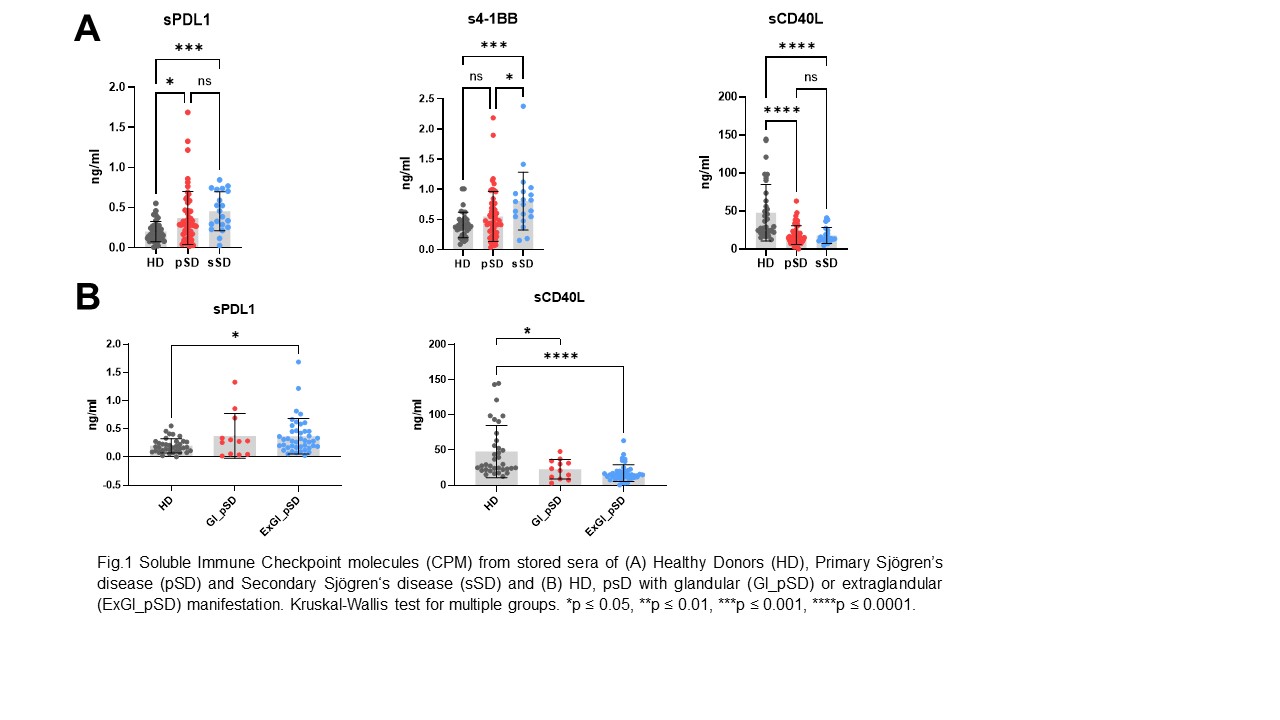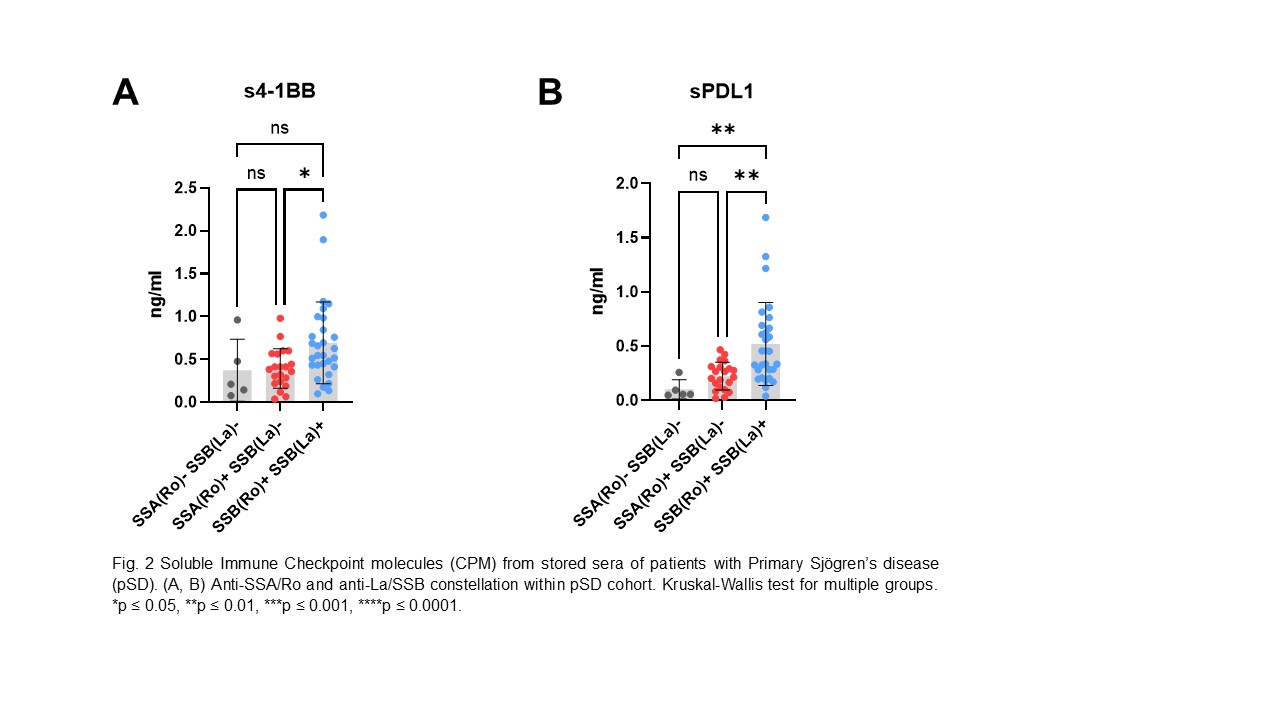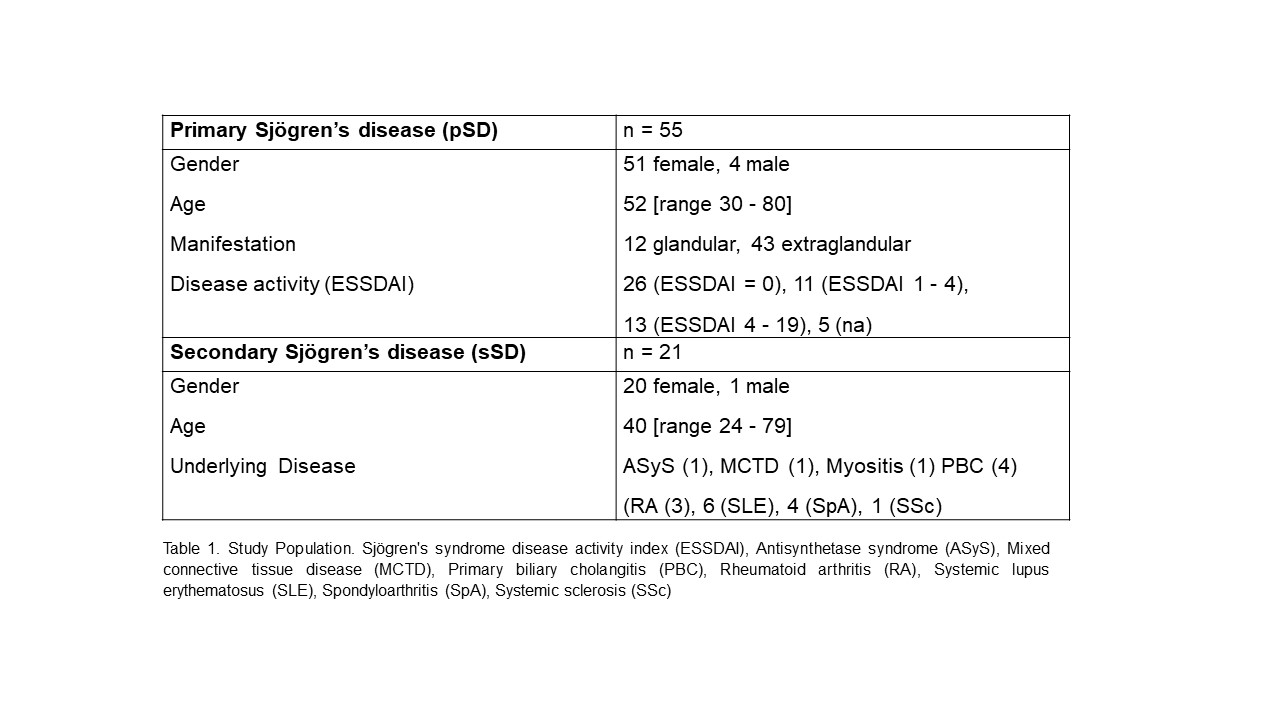Session Information
Session Type: Poster Session B
Session Time: 10:30AM-12:30PM
Background/Purpose: Primary Sjögren’s disease (pSD) is a chronic autoimmune disease characterized by lymphocytic infiltration of the exocrine glands, leading to sicca symptoms and several extraglandular organ involvements. Co-stimulatory and co-inhibitory checkpoint molecules (CPM) are key players in modulating immune responses, and their soluble forms were recently identified as biomarkers for autoimmune congenital heart block in anti-SSA positive pregnant women (1). However, there is a lack of data regarding CPM in pathophysiology and as potential biomarkers in pSD.
Methods: We analyzed serum samples as well as clinical and serological data from 55 patients with pSD, 21 with secondary Sjögren’s disease (sSD) and 37 healthy donors (HD) as controls. Serum levels of various soluble molecules were assessed using a bead-based multiplex immunoassay, including co-stimulatory (sCD86, s4-1BB, sCD25, sCD27), co-inhibitory CPM (sCTLA-4, sPD-1, sPD-L1, sPD-L2, sTim-3, sLAG-3, sGAL-9) as well as several cytokines (sIFNa2, sIFNb, sIFNg, sIFNLa1, sIFNLa2/3, sIL-2, sIL-10). Siglec-1 expression on monocytes was measured as a surrogate marker of type I IFN signature and known risk factor for extraglandular manifestations in pSD (2,3).
Results: Patients with pSD and sSD had significantly higher circulating levels of sPD-L1 compared to HD, while levels of s4-1BB were significantly higher only in sSD (Fig. 1A), in contrast to diminished sCD40L in both Sjögren’s cohorts compared to HD. Among pSD patients, elevation of sPD-L1 and a decrease of sCD40L were most pronounced findings among individuals with extraglandular disease (ExGl_pSD) (Fig. 1B). Consistent with previous findings, type I IFN (sIFNa2) signature was significantly more present in pSD, especially in extraglandular pSD patients. However, there was no correlation between different IFN levels (concentrations and Siglec-1 expression) and sPD-L1, s4-1BB or sCD40L levels, suggesting an IFN-independent mechanism underlying the observed differences. sPD-L1 and s4-1BB correlated with serologic characteristics (ANA titers). Moreover, anti-SSA/Ro and anti-La/SSB double positive pSD patients showed the highest levels of sPD-L1 and s4-1BB (Fig. 2).
Conclusion: This data suggests that soluble PD-L1, 4-1BB and CD40L candidate as type I IFN-independent biomarkers in pSD requiring further mechanistic delineation but have a potential to support clinical applications in extraglandular manifestations.
Literature
1. Stefanski AL, Rincon-Arevalo H, Nomovi N, Aue A, Ritter J, Wiedemann A, et al. POS0245 SOLUBLE CHECKPOINT MOLECULES AS PREDICTIVE BIOMARKERS FOR AUTOIMMUNE CONGENITAL HEART BLOCK. Ann Rheum Dis. 2024 Jun 1;83(Suppl 1):280.
2. Rose T, Szelinski F, Lisney A, Reiter K, Fleischer SJ, Burmester GR, et al. SIGLEC1 is a biomarker of disease activity and indicates extraglandular manifestation in primary Sjögren’s syndrome. RMD Open. 2016 Dec 1;2(2):e000292.
3. Ritter J, Szelinski F, Aue A, Stefanski AL, Rincon-Arevalo H, Chen Y, et al. Elevated unphosphorylated STAT1 and IRF9 in T and B cells of primary sjögren’s syndrome: Novel biomarkers for disease activity and subsets. Journal of Autoimmunity. 2024 Jul 1;147:103243.
To cite this abstract in AMA style:
Aue A, Szelinski F, Rincón-Arévalo H, Ritter J, Wiedemann A, Dreveton L, Schrezenmeier E, Lino A, Dörner T, Stefanski A. Soluble Immune Checkpoint Molecules as Biomarkers for Extraglandular Sjögren’s Disease [abstract]. Arthritis Rheumatol. 2024; 76 (suppl 9). https://acrabstracts.org/abstract/soluble-immune-checkpoint-molecules-as-biomarkers-for-extraglandular-sjogrens-disease/. Accessed .« Back to ACR Convergence 2024
ACR Meeting Abstracts - https://acrabstracts.org/abstract/soluble-immune-checkpoint-molecules-as-biomarkers-for-extraglandular-sjogrens-disease/



